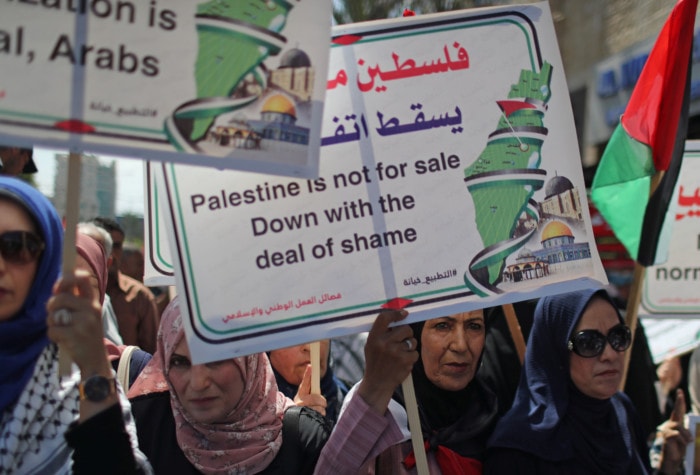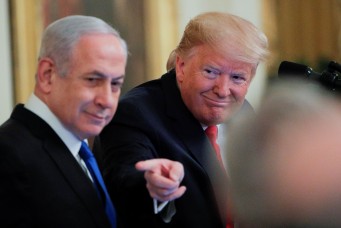Why Palestinians consider the UAE-Israel Deal a strategic betrayal
Palestinian anger rises towards the UAE-Israel deal, which is not only a breach of international law, but also perceived as a betrayal of long-standing Arab solidarity with Palestine.

Palestinian anger continues to brew following the shocking tripartite announcement by the United Arab Emirates, the United States, and Israel about full normalization of relations between Abu Dhabi and Tel Aviv. Palestinian knowledge of previously warming relations between the UAE and Israel has not dampened their sentiments of betrayal. This is warranted and completely understandable because the agreement is seen by Palestinians as a strategic shift away from many decades-old foundations in Arab politics and regional dynamics. In fact, the UAE’s step signals a strategic realignment of alliances and priorities in the region that will undoubtedly have consequential ramifications on the Palestinian cause.
The reasons for Palestinian trepidation are many. For one, the Emirati announcement represents a strategic blow to the Palestinian people’s most valuable political asset: a unified Arab commitment to achieving Palestinian rights the way the leadership in Ramallah defines them. The move by the UAE now breaks from that unified Arab position, which at its core enshrined respect for the Palestinians’ sovereign decisions in reaching a conclusive agreement with Israel that ends its occupation of the territory occupied since 1967 (the West Bank, including East Jerusalem, and the Gaza Strip) and resolves the issue of Palestine refugees in line with international law and UN General Assembly Resolution 194.
This doctrine was sanctified in the Arab League’s 1974 Rabat Summit, when Arab regimes reluctantly recognized the Palestine Liberation Organization (PLO) as the sole legitimate representative of the Palestinian people and pledged to support the Palestinian cause without purporting to speak on behalf of Palestinians or usurping their voice. The decision was a historic political recognition that propelled the Palestinian national struggle to international recognition. That year, the United Nations invited the late Yasser Arafat to the General Assembly in New York to deliver his first and historic speech, and the PLO joined the Non-Aligned Movement two years after that.
The U.S.-Emirati deal also defies Palestinian and Arab positions in response to U.S. President Donald Trump’s plan for “peace.” By normalizing ties with Israel, the UAE openly endorses the Trump plan’s rubber stamp approval of Israeli annexation of Palestinian territory (and Syria’s Golan Heights) and the complete sidelining of international law, as well as its ensuring of the perpetual denial of the Palestinian people’s right to gain sovereignty in their own state.
The Emirati move comes despite the Palestinian leadership’s vehement and unequivocal rejection of the Trump plan, a response which was subsequently supported by the Arab League and the Organization of Islamic Cooperation(OIC). Other international actors, including the European Union, also voiced serious concerns about the plan’s departure from the rules and principles of international law.
The Emirati step also defies the Arab League’s Charter, which clearly states that members must respect the sovereignty and territorial integrity of other members. By accepting the Trump “plan”, the UAE violates this founding principle of the Arab League and peremptory norm of international law. Ironically, the UAE’s action in this regard endorses the very logic and hostile actions that have maintained Iran’s illegal control of three Emirati islands, which Arab countries have rightfully rejected and opposed.
Equally significant, the UAE-Israel deal violates the Arab Peace Initiative of 2002, which was enshrined in United Nations Security Council resolution 1515 in 2005 and endorsed by the OIC in 2007. This Initiative provided the Palestinian leadership with powerful political leverage: namely, the promise of formal normalization between Israel and the Arab and Muslim states in exchange for an end to Israeli occupation of Palestinian and Arab territories in line with international law. For eighteen years, Israel rejected this offer, becoming even more intransigent under Israeli Prime Minister Benjamin Netanyahu in the past eleven years.
In effect, the UAE-Israel pact is a reward for these grave Israeli violations of international law and Palestinian rights. It validates Netanyahu’s mantra that Israel can achieve “peace for peace” and that the Palestinian cause was irrelevant and inconsequential to Arab countries. Equally dangerous, in the fine print of this agreement, is the dangerous attempt to falsely reduce the conflict to one of religious tension that is resolved by working on religious tolerance and access to prayer at the Al-Aqsa Mosque Compound.
This framing denies the historical, cultural, and national roots and ties of Palestinians, Christians and Muslims to Jerusalem specifically and Palestine in general. This one-dimensional and deficient logic is only upheld by fanatics of all affiliations, whose agenda has severely undercut the chances of peace in the region. It is detached from the historical, cultural, and political truth of the conflict. The core of this conflict is the systematic denial of the Palestinian people’s right to self-determination and freedom, facilitated by methodical dehumanization, which in turn normalizes their brutal and perpetual subjugation. This logic dictates policy in Tel Aviv and Washington, and the UAE announcement has endorsed it. In this context, the Palestinian leadership’s view that this deal is a sell-out and a betrayal is only logical.
Israel’s colonial agenda of displacement and replacement is in overdrive. Israeli settlement construction and expansion, demolition of Palestinian homes and property, as well as expropriation of Palestinian territory and lethal brutality against civilians have skyrocketed in recent years.
In the first six months of 2020 alone, Israel demolished as many Palestinian homes and structures as it did during the entire previous year. In the few weeks preceding the fateful Emirati-Israeli announcement, Israel took a series of strategic steps that crossed several previously set international “red lines”, including construction and zoning in the so-called E-1 and Givat Ha Matos settlements whose construction effectively and practically chokes Jerusalem and severs contiguity of the West Bank. Israel also took practical steps in Hebron to strip the City’s municipality of its rights and grant the illegal settlements implanted there the right to control and alter the Old City, including the Ibrahimi Mosque. All these steps must also be understood in the context of Israel’s racist nation-state law, which defines the right to self-determination in historical Palestine as an exclusively Jewish one.
In addition to clearly, belligerently, and unapologetically defying international law, these Israeli steps affirm the Israeli government’s determination to accelerate de facto annexation of occupied Palestinian territory, irrespective of a formal annexation announcement. Such realities couldn’t have been missed by the UAE.
Closer to home for Palestinians at all levels, perhaps, nothing invites more anger than the UAE’s discredited claim that its normalization with Israel was in exchange for Israel halting its formal annexation plans. This claim is viewed as a cynical attempt to use the Palestinian cause as a “fig leaf.” It is also one that the Israeli Prime Minister quickly exposed and debunked as a public relations stunt, when he said less than an hour after the White House announcement that he remained committed to annexation.
Even without the Netanyahu statement, the dismal reality on the ground in the Occupied Palestinian Territory, including East Jerusalem, is irrefutable. Israeli de facto annexation of Palestinian land is relentless and its fervent commitment to prohibiting the realization of Palestinian sovereignty is also both glaring and unmistakable. Claiming that this agreement can advance peace is hence pure fiction at best or a cynical employment of Trump’s favorite tool: “alternative facts”.
Pouring salt over the Palestinian wound is the rush to welcome the UAE-Israel deal by some Arab countries, namely Egypt, Oman, Bahrain, and Mauritania. This raises fears that other Arab states could be encouraged or pushed by the Emirati step to reach similar deals with Israel, which would completely unravel regional political dynamics. In turn, the Trump administration would use such additional deals to strengthen its arm-twisting strategy against the Palestinian people, believing that applying yet more political and financial pressure would result in their acquiescence and surrender.
The ramifications of the Emirati-Israeli normalization are also globally far-reaching. This deal undermines the standing and relevance of peremptory norms of international law, specifically the strict prohibition of annexation. It also openly defies several United Nations Security Council resolutions on the illegality of Israel’s annexation of Jerusalem and the Syrian Golan Heights. Most potently perhaps, it undermines international efforts to protect the rules-based international order from further debilitation due to unilateralism, isolationism, and other destructive global trends endorsed by the Trump administration and espoused by a coalition of rightwing leaders worldwide.
In short, the Israel-UAE deal normalizes the previously unthinkable; including the war crime of annexation and the dogma of might, is right regardless of international law and norms. This deal does not provide a chance for resumption of talks as some have wishfully claimed, nor does it grant the UAE access to alter Israel’s policy as clearly demonstrated by the announcement of the deal. The damage is already done and the taboo has been broken.
The picture may look quite dire, but Palestinians are not alone. Their cause remains a rallying point of progressive forces and human rights advocates around the world. This is an alliance based on principle, not Realpolitik.
The final word on these transformative changes in the region belongs to the Palestinian people and it remains unsaid. Palestinian acquiescence and capitulation, much to the dismay of the Trump camp and company, are not viable options no matter the betrayals or extreme pressure. For over a century now, Palestinians have demonstrated that their determination to achieve freedom and sovereignty is unwavering.
Without justice in Palestine, this bleeding wound in the heart of the international order will not heal.




